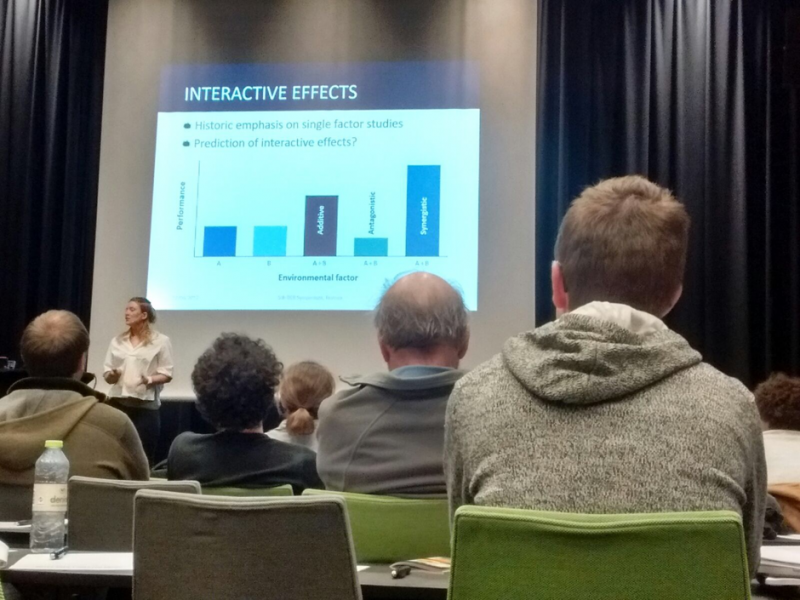5th International Symposium on Dynamic Energy Budget Theory: Norway
Rose Stainthorp
NOC Southampton

The 5th International Symposium on Dynamic Energy Budget (DEB) theory was held in Tromso, Norway this summer (2017) and included delegates from 13 different countries around the world. The topics covered a broad temporal and spatial scale, ranging from species-specific applications of DEB theory to understand processes at the sub-cellular level, through to development of General Ecosystem Models and the “evolution of syntrophic symbiosis” amongst others. This year there were keynote presentations from top ecologists and physiologists, panel discussions including both experts in the field and early career researchers and PhD students, as well as a series of workshops preceding the conference focused on applications of the DEBtool package software. I was lucky enough to be selected to give a talk from my current PhD research, as well attend the workshops and symposium, which was only possible with the generous funding from the Challenger Society for Marine Science.
The International Symposium on DEB theory is held once every two years, hosted by a different DEB research group in their respective country each time. It is the only conference focused specifically on Dynamic Energy Budget theory, bringing together the leaders in this field to discuss the most recent advances, and as such is a fantastic opportunity for early career researchers and scientists from other disciplines to come together and learn the state of the art. It was particularly important for me to attend this year, my final PhD year, as I could present the results of my current research directly to the scientists I hope to reach with any publications from the work, gain valuable feed-back, and build my professional network to establish new collaborations and potential post-doc positions.
One of the most valuable outcomes from my attendance at the symposium was the arrangement of a short-term research placement at IFREMER in Brest, France; to work with the DEB research group there on a project related to my PhD topic that I proposed and independently obtained funding for. This placement will allow me to collaborate with a whole new network of scientists in the field, and to learn new skills outside of those I have already developed during my PhD. Having the opportunity to meet these scientists in person, and for them to hear about my work through my presentation, is what made my proposal successful and I would like to thank the Challenger Society for Marine Science for awarding me the funding to attend this amazing symposium.
Profile:
I am a third year PhD student at the National Oceanography Centre as part of a joint project between the University of Southampton and the British Antarctic Survey. Combining experimental and modelling approaches I aim to examine how varying environmental stressors impacts the energy budget of marine invertebrates. I seek to understand how changes in the life history of an individual can be integrated into bioenergetic models, to make predictions of the population- and community-level consequences of climate change.
Latest News
Royal Society Publishing Photography Competition 2025
Please see a message from the Royal Society below:
We are delighted to announce that the 2025 Competition is now open for entries until 15 August for a chance to win £1000! The competition celebrates the power of photography in conveying the wonder of science happening all around us and photographs can be submitted in the categories of: Astronomy, Behaviour, Earth Science and Climatology, Ecology and Environmental Science, and Microimaging.
The competition is free to enter and open to anyone studying or working in science at graduate level or above. Category winners will receive a one-year membership to the Royal Photographic Society and the overall winner will receive a grand prize of £1,000. Find out more: https://bit.ly/RSPphotocomp
October 2025 MEDIN Workshop: Marine Data Management, Governance and the MEDIN toolset
The Marine Environmental Data and Information Network (MEDIN) are pleased to announce that registration is now open for the next occurrence of our popular free online training workshop: ‘Marine Data Management, Governance and the MEDIN toolset’ on the 13th – 17th October 2025 on OceanTeacher Global Academy.
Marine Data Management, Governance and the MEDIN toolset
The Marine Environmental Data and Information Network (MEDIN) and OceanWise are delighted to invite you to attend our popular free online training workshop: ‘Marine Data Management, Governance and the MEDIN toolset’ on the 19th – 23rd of May 2025.
